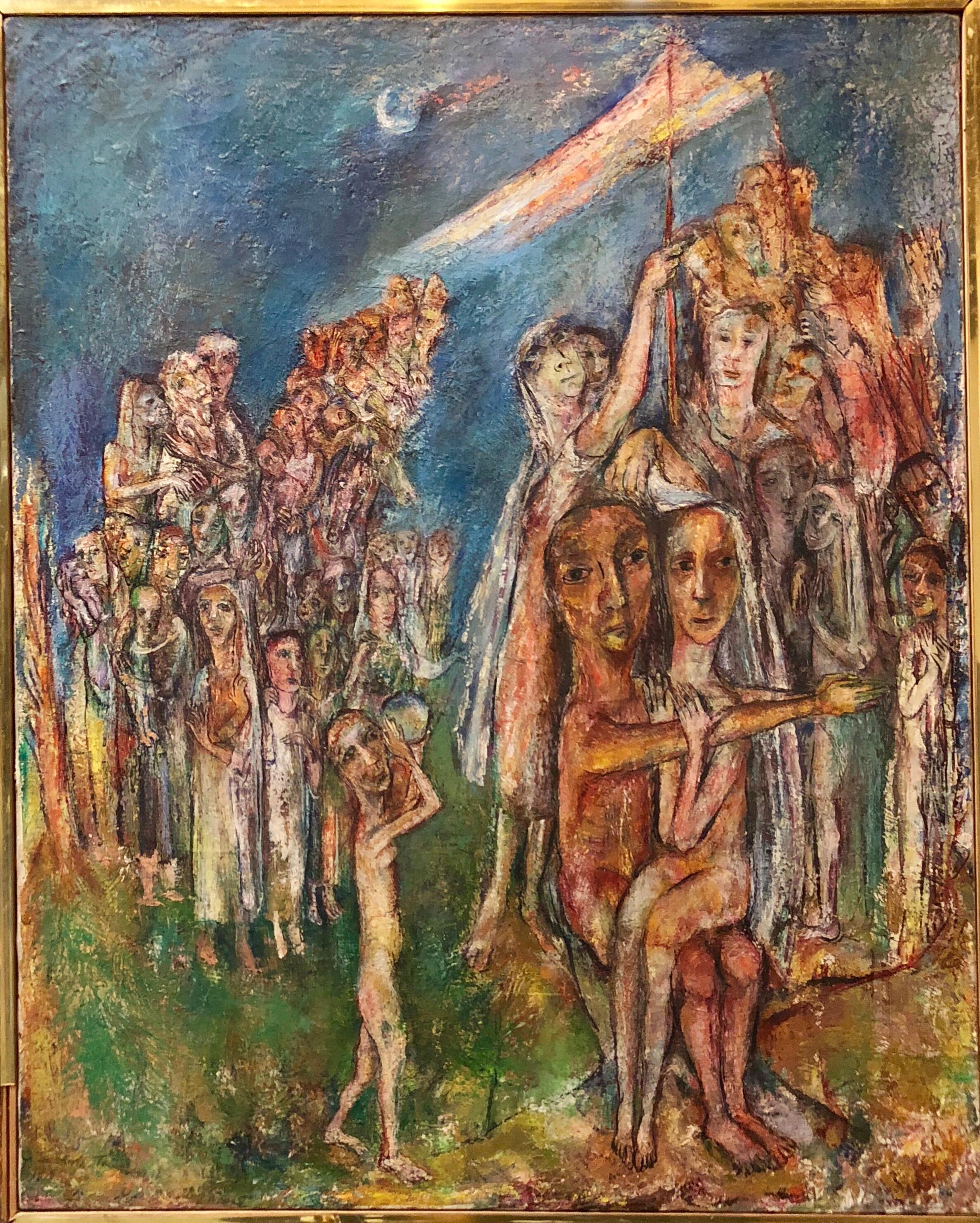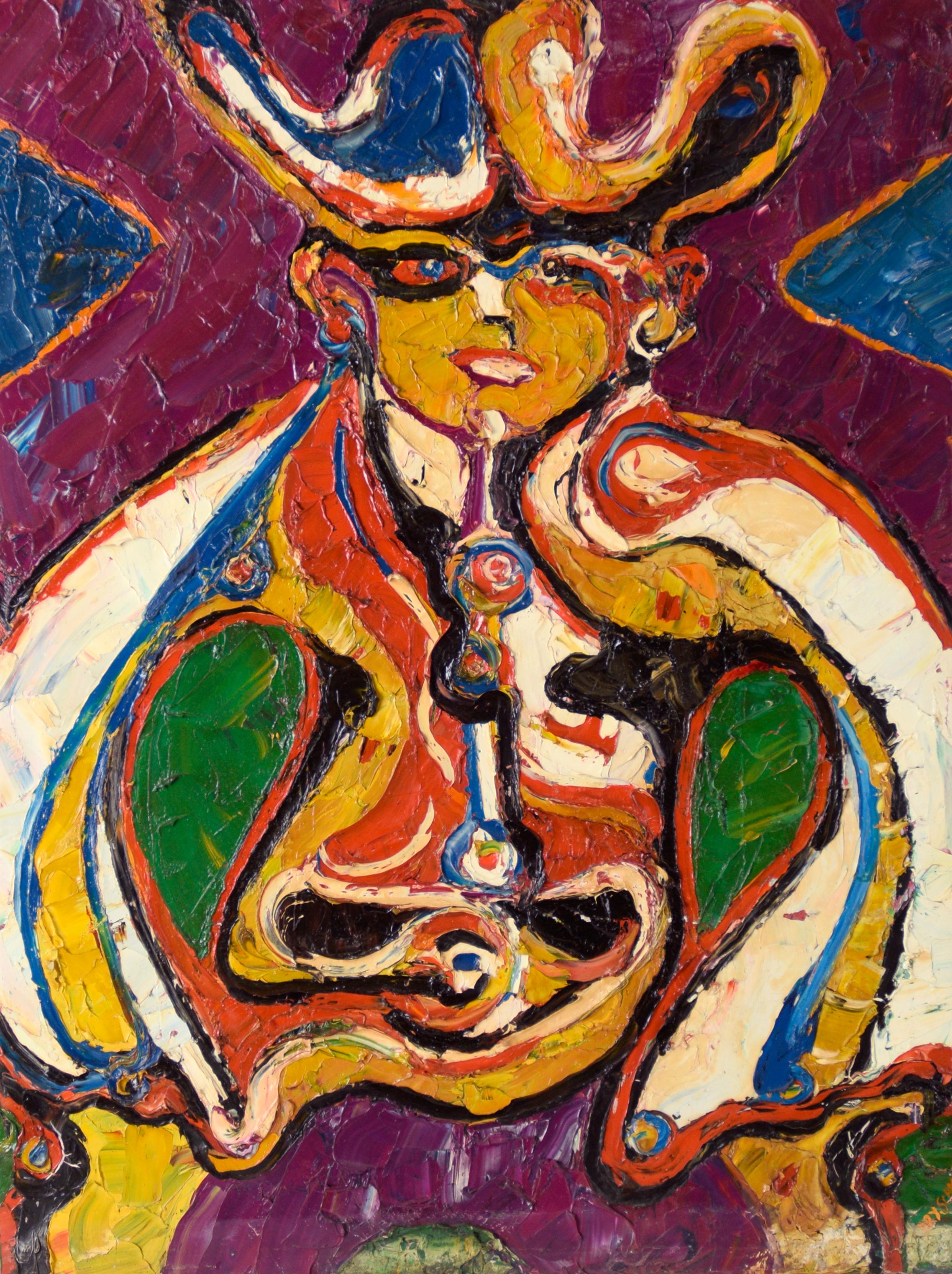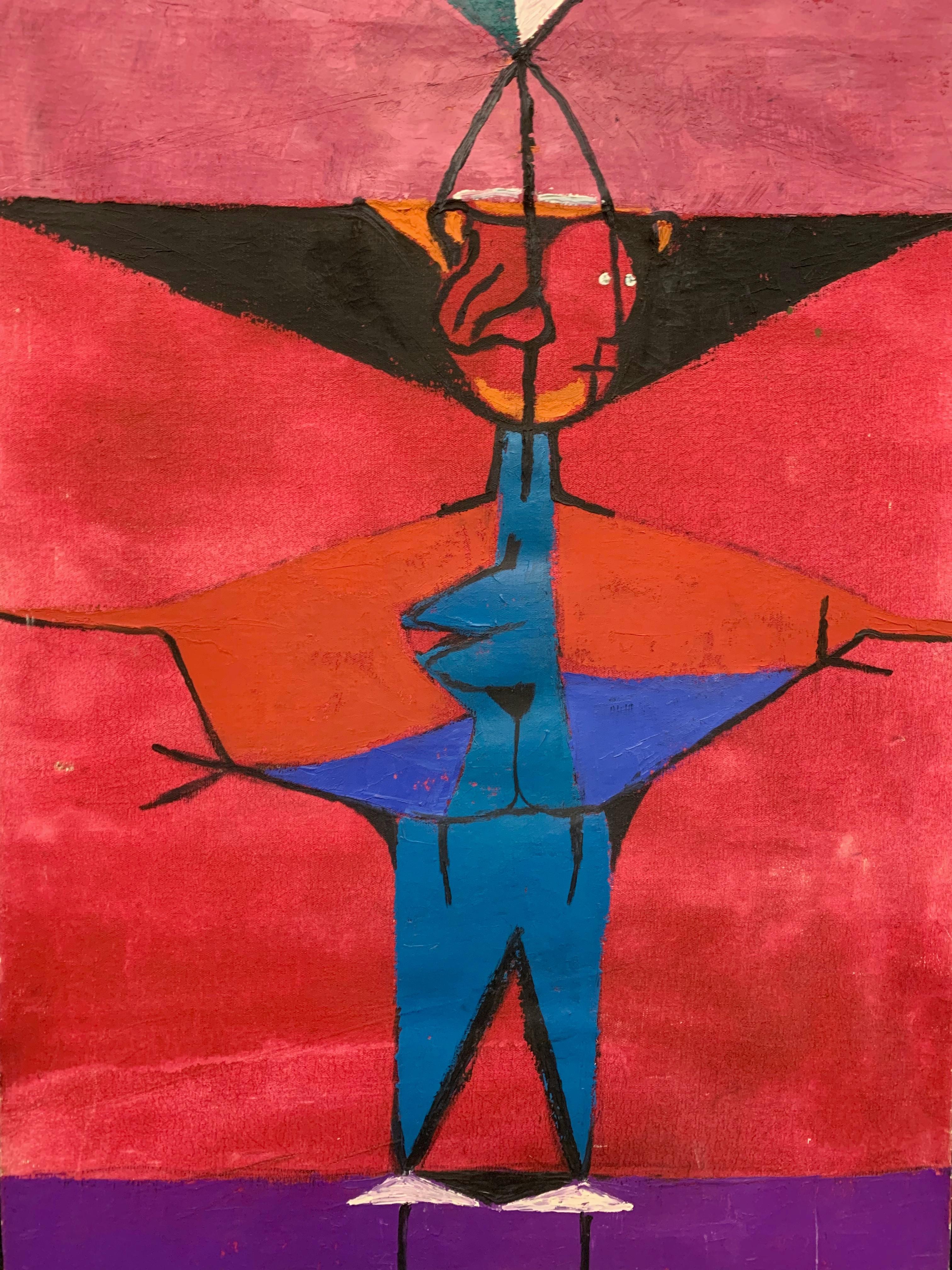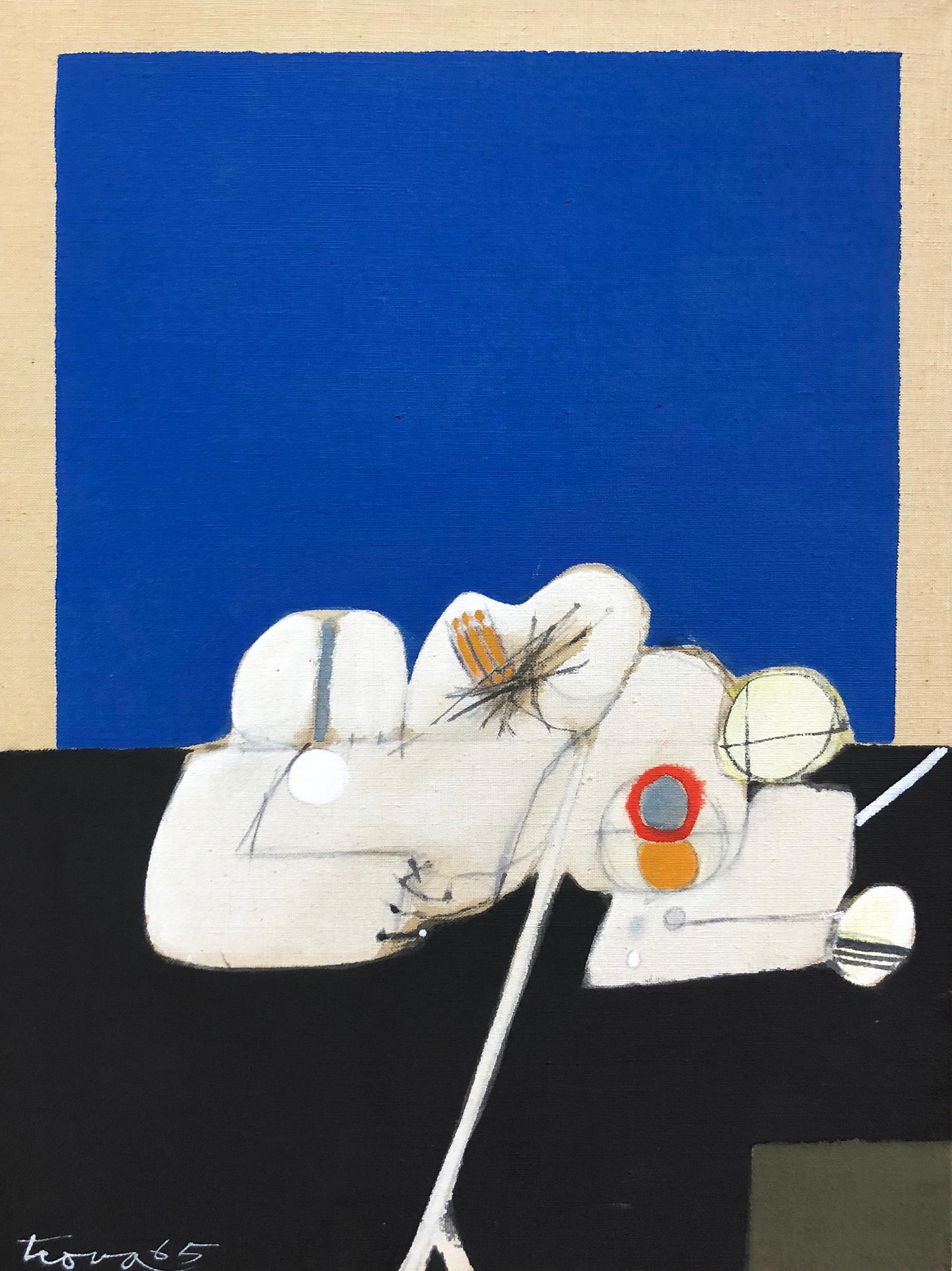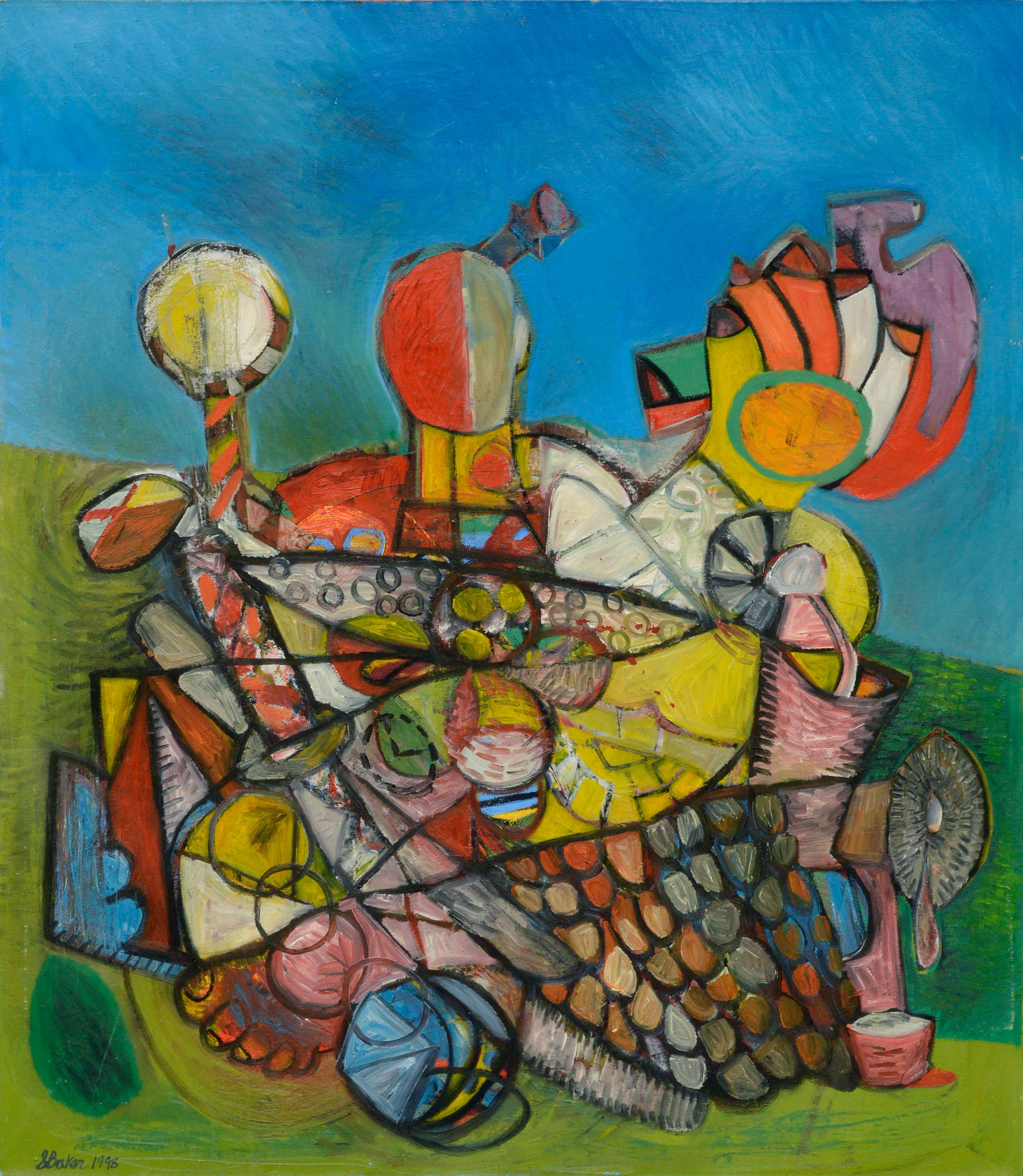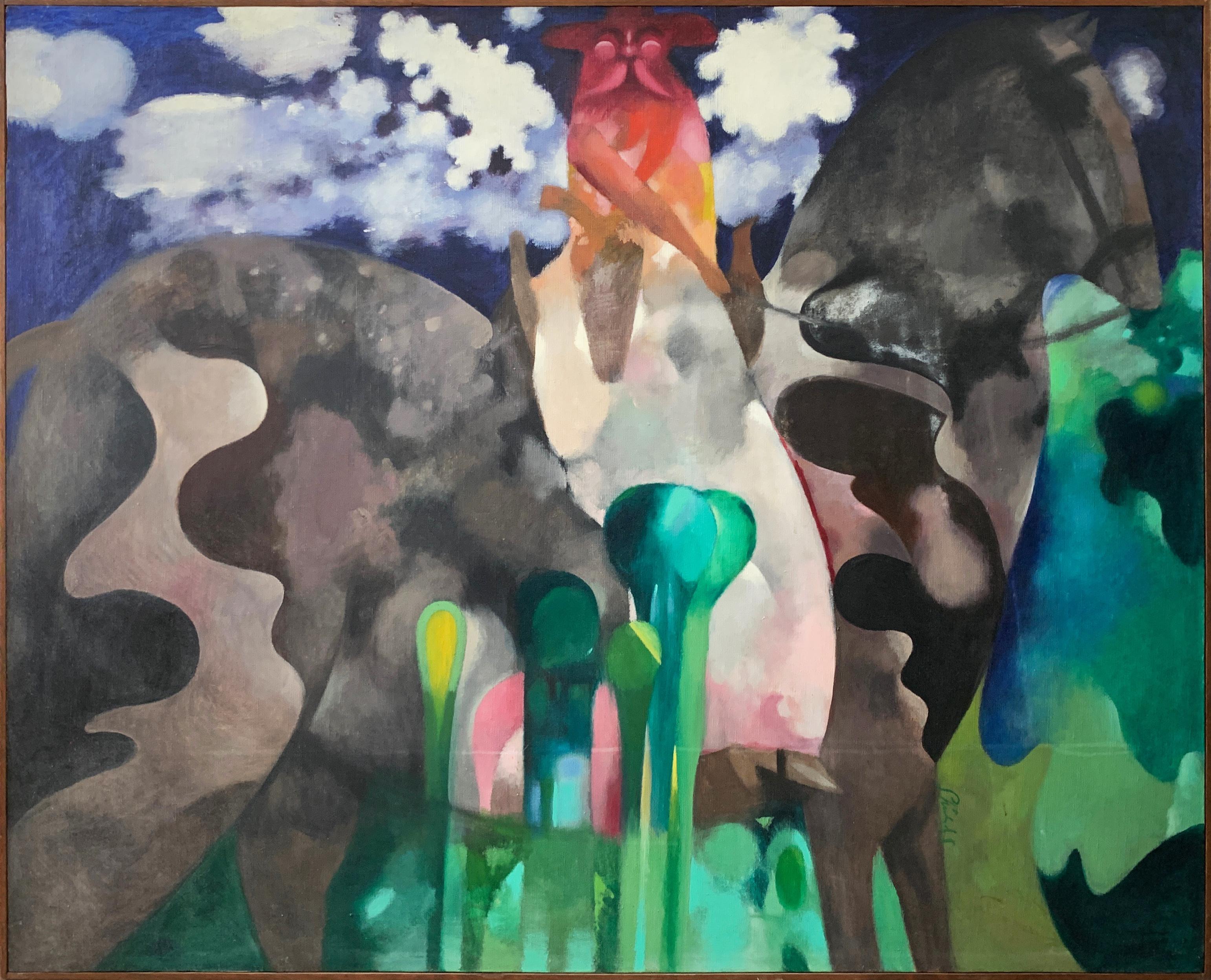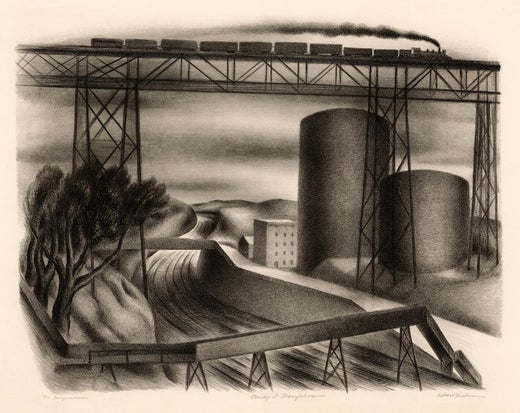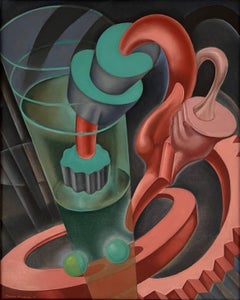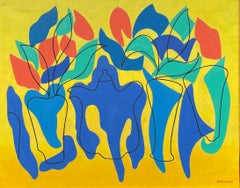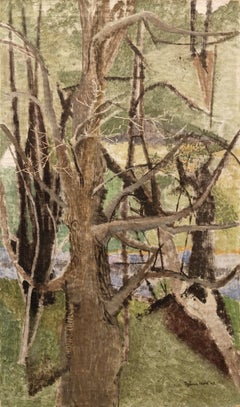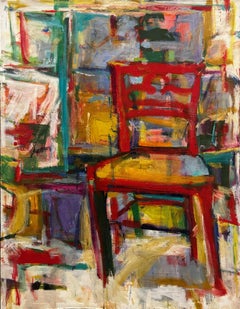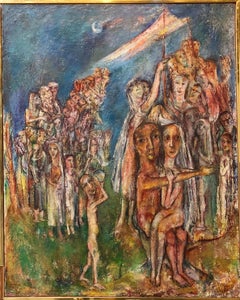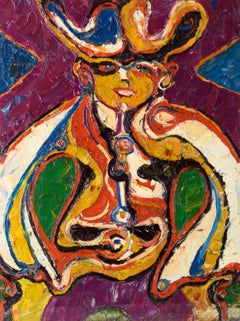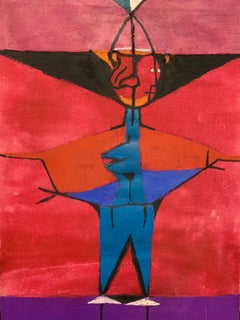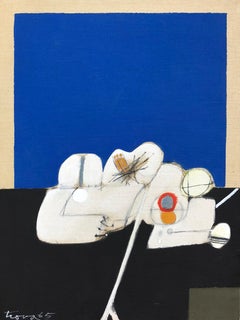Items Similar to "Untitled" Albert Heckman, 1950s Modernist Abstracted Still Life Painting
Want more images or videos?
Request additional images or videos from the seller
1 of 10
Albert Heckman"Untitled" Albert Heckman, 1950s Modernist Abstracted Still Life PaintingCirca 1950
Circa 1950
About the Item
Albert Heckman
Untitled, circa 1950
Signed lower right
Oil on canvas
21 1/4 x 29 inches
Albert Heckman was born in Meadville, Western Pennsylvania, 1893. He went to New York City to try his hand at the art world in 1915 after graduating from high school and landing a job at the Meadville Post Office. In 1917, at the age of 24, Heckman enrolled part-time in Teachers' College, Columbia University's Fine Arts Department to begin his formal art education. He worked as a freelance ceramic and textile designer and occasionally as a lecturer at the Metropolitan Museum of Art. In the early 1920s, at the age of almost 30, he graduated with a Bachelor of Arts degree from Columbia Teachers College. He was especially impacted by his instructor at Columbia, Arthur Wesley Dow.
After graduating, he was hired by the Teachers' College as a Fine Arts instructor. He stayed with Columbia Teachers' College until 1929, when he left to attend the Leipzig Institute of Graphic Arts in Leipzig, Germany. Isami Doi (1903-1965), who was born in Hawaii, was arguably his most impressive student at Columbia. Doi is now regarded as one of the most prominent artists hailing from Hawaii. Heckman became an active member and officer of the Keramic Society and Design Guild of New York in the 1920s as part of his early commercial art career. The Society's mission was to share knowledge and showcase textile and ceramic design exhibits.
In 1922, Heckman married Florence Hardman, a concert violinist. Mrs. Heckman's concert schedule during the 1920s kept Albert and Florence Heckman apart for a significant portion of the time, but they spent what little time they had together designing and building their Woodstock, New York, summer house and grounds. A small house and an acre of surrounding land on Overlook Mountain, just behind the village of Woodstock, were purchased by Albert and Florence Heckman at the time of their marriage. Their Woodstock home, with its connections, friendships, and memories, became a central part of their lives over the years, even though they had an apartment in New York City.
Heckman's main artistic focus shifted to the house on Overlook Mountain and the nearby towns and villages, Kingston, Eddyville, and Glasco. After returning from the Leipzig Institute of Graphic Arts in 1930, Mr. Heckman joined Hunter College as an assistant professor of art. He worked there for almost thirty years, retiring in 1956. Throughout his tenure at Hunter, Mr. Heckman and his spouse spent the summers at their Woodstock residence and the winters in New York City. They were regular and well-known guests at the opera and art galleries in New York. Following his retirement in 1956, the Heckmans settled in Woodstock permanently, with occasional trips to Florida or Europe during the fall and winter. Mr. Heckman's close friends and artistic career were always connected to Woodstock or New York City. He joined the Woodstock art group early on and was greatly influenced by artists like Paul and Caroline Rohland, Emil Ganso, Yasuo Kuniyoshi, Andre Ruellan, and her husband, Jack Taylor.
Heckman operated a summer art school in Woodstock for several years in the 1930s with support from Columbia University, where these and other Woodstock artists gave guest lectures. The Potter's Shop in New York City hosted Mr. Heckman's first art show in December 1928. The exhibit received some positive reviews from critics. The American Institute of Graphic Arts chose the plate of "Wehlen, Saxony" as one of the "Fifty Prints of the Year in 1929." There were sixteen etchings displayed. The remaining plates depicted scenes in Saxony, Germany, while five of the plates were based on scenes in Rondout, New York.
Heckman started switching from etching to black and white lithography by the early 1930s. A lifelong admirer of Heckman's artwork, Mr. Gustave von Groschwitz organized a significant exhibition of Heckman etchings and lithographs at the Ferargil Gallery in New York City in 1933. The exhibition traveled to the Stendahl Galleries in Los Angeles (May 1933), the Charles Lessler Gallery in Philadelphia (May 1933), J.L. Hudson in Detroit (June 1933), and Gumps in San Francisco (July 1933). Together with his early etchings, the exhibition featured brand-new black and white lithographs depicting scenes in and around Woodstock as well as "A View from Tudor City," a black and white lithograph of a scene of 42nd Street in New York City. The exhibit was briefly mentioned in the New York Times and on April 23, 1933: "Mr. Heckman's work is strong and original as witness the "Rondout Bridge" etching which is scarcely more than an angle and reverse curves done with great sweep."
In 1935, von Groschwitz again arranged for a Heckman exhibition at the Ferargil Gallery. The exhibition consisted of black and white lithographs and pen and pencil drawings. The Herald Tribune wrote of these works, "His studies of trees drawn with lyrical feeling are notable." Despite modest sales and comparatively positive reviews from Times and Tribune critics, Mr. Heckrnan's formal one-man shows came to an end with the second exhibit at the Ferargil Gallery. He was to limit himself to showcasing individual pieces at both domestic and international exhibitions following his 1935 Ferargil Show.
Gertrude Vanderbilt Whitney was a significant influence on the Woodstock art scene in the early 1930s, first through her Greenwich Village Studio Club and then through the Whitney to promote American contemporary art. Mr. Heckman knew Herman More, the curator of the Whitney Museum, and Juliana Force, its first director, both of whom lived in Woodstock. From the First Biennial Exhibition of American Sculpture, Watercolor and Prints in December 1933 to the annual Exhibition of Sculpture, Watercolor and Drawings in 1956, Mr. Heckman displayed his work at Whitney exhibitions for nearly 25 years, in part because of these connections. Mr. Heckman' s major lithographs and prints made during the 1930s include the black and white lithographs "Bridge at Poughkeepsie," "Loading Lumber," “Oil
Yards at Rondout," "Car Barns at Kingston”, “Old Locks at Eddyville”, "Crossroads," "Stoney Hollow Railroad Station, "Rip Van Winkle Bridge," "Sudden Rain," and "Deserted Village”. In addition to his participation at the Whitney during the 1930's, Heckman presented lectures, using his work for illustrative purposes, at several colleges and universities on the object of etching and lithography. He actively participated in the Federal Art Projects during the 1930s Depression and created "Sudden Rain" and "Stoney Hollow Railway Station" as part of these initiatives. His black and white lithographs "Wind and Rain" and "Windblown Trees," as well as the roulette drypoint "Deserted Village," were featured in the first catalogues produced by the Associated American Artists, an organization of which Heckman was a founding member.
Heckman’s style had matured by the 1930s, transitioning from his early stiff etchings to more poetic black and white lithographs and drawings. He switched from etchings and black-and-white lithographs, which had been his primary mediums, to oils and watercolors in the late 1930s and early 1940s. Heckman's oil painting, "Eddyville, New York," was displayed in the Carnegie Institute's October–December 1941 Directions in American Painting exhibit in Pittsburgh. In 1942, his oil painting "Glasco Landscape" was displayed in the Metropolitan Museum of Art's Artists for Victory: An Exhibition of Contemporary American Art. Heckman finished a number of watercolor paintings of scenes in the Woodstock and Kingston, New York, areas in the 1940s.
In the 1950s, he painted a series of abstract watercolor designs that would serve as the foundation for a number of color lithographs. The Cincinnati Art Museum's Curator of Prints, Gustave von Groschwitz, began a series of international color lithography exhibitions in the 1950s. The color lithograph "Fruit Forms," which was displayed at the Whitney's Annual Exhibition of Contemporary American Sculpture, Watercolor and Prints in January 1937, is currently part of the Whitney permanent collection.
In 1958, Heckman retired from Hunter College, and the Heckmans relocated from New York City to Woodstock as their permanent residence. He mostly created abstract designs in oils, watercolors, and inks while he was retired. He didn't have many exhibitions in the 1960s. Appropriately, his final public display took place at an exhibition honoring the 50th anniversary of the Woodstock Artists Association in Woodstock, New York. The lithographer, painter, etcher, and teacher Albert Heckman cherished Woodstock and New York. With the intention of preserving the Woodstock art scene and way of life that he and his wife, Florence, had helped to create, he left money to the Woodstock Art Association in his will. He is buried in the Artists' Cemetery in Woodstock, New York, alongside his wife, Florence, after passing away in Kingston, New York, in February 1971.
- Creator:Albert Heckman (1893-1971, American)
- Creation Year:Circa 1950
- Dimensions:Height: 30.5 in (77.47 cm)Width: 38.5 in (97.79 cm)
- More Editions & Sizes:Unique WorkPrice: $8,000
- Medium:
- Movement & Style:
- Period:
- Condition:
- Gallery Location:New York, NY
- Reference Number:1stDibs: LU1841215188632
Albert Heckman
Born in Meadville, Pennsylvania, Heckman came to NYC in 1915 and divided his time between there and Woodstock for the rest of his life except for 1929, when he studied in Leipzig. Married to concert violinist Florence Hardeman. Position: teacher, Hunter College, 1930-58; Teachers College Summer School, Woodstock, 1930s. Author: Paintings of Many Lands and Ages. He was a member of the Woodstock Art Association; and was also part of the Works Progress Administration Federal Arts Program in New York City, doing etching and block printing. He was influenced by Cubism and Expressionism.
About the Seller
5.0
Gold Seller
Premium sellers maintaining a 4.3+ rating and 24-hour response times
Established in 2022
1stDibs seller since 2022
98 sales on 1stDibs
Typical response time: <1 hour
- ShippingRetrieving quote...Shipping from: New York, NY
- Return Policy
Authenticity Guarantee
In the unlikely event there’s an issue with an item’s authenticity, contact us within 1 year for a full refund. DetailsMoney-Back Guarantee
If your item is not as described, is damaged in transit, or does not arrive, contact us within 7 days for a full refund. Details24-Hour Cancellation
You have a 24-hour grace period in which to reconsider your purchase, with no questions asked.Vetted Professional Sellers
Our world-class sellers must adhere to strict standards for service and quality, maintaining the integrity of our listings.Price-Match Guarantee
If you find that a seller listed the same item for a lower price elsewhere, we’ll match it.Trusted Global Delivery
Our best-in-class carrier network provides specialized shipping options worldwide, including custom delivery.More From This Seller
View All"Energy Manifestation #4" Kimon Nicolaides, 1933 Dynamic Cubist Composition
Located in New York, NY
Kimon Nicolaides
Energy Manifestation #4, 1933
signed and dated lower left
oil on canvas
30 x 24 inches
Kimon Nicolaїdes (10 June 1891 – 18 July 1938), was an American artist, educ...
Category
1930s Modern Abstract Paintings
Materials
Canvas, Oil
"Untitled" Albert Heckman, Still Life, Floral Abstracted Modernist Composition
By Albert Heckman
Located in New York, NY
Albert Heckman
Untitled, circa 1950
Signed lower right
Oil on canvas
25 1/4 x 32 1/4 inches
Albert Heckman was born in Meadville, Western Pennsylvania, 1893. He went to New York City to try his hand at the art world in 1915 after graduating from high school and landing a job at the Meadville Post Office. In 1917, at the age of 24, Heckman enrolled part-time in Teachers' College, Columbia University's Fine Arts Department to begin his formal art education. He worked as a freelance ceramic and textile designer and occasionally as a lecturer at the Metropolitan Museum of Art. In the early 1920s, at the age of almost 30, he graduated with a Bachelor of Arts degree from Columbia Teachers College. He was especially impacted by his instructor at Columbia, Arthur Wesley Dow.
After graduating, he was hired by the Teachers' College as a Fine Arts instructor. He stayed with Columbia Teachers' College until 1929, when he left to attend the Leipzig Institute of Graphic Arts in Leipzig, Germany. Isami Doi (1903-1965), who was born in Hawaii, was arguably his most impressive student at Columbia. Doi is now regarded as one of the most prominent artists hailing from Hawaii. Heckman became an active member and officer of the Keramic Society and Design Guild of New York in the 1920s as part of his early commercial art career. The Society's mission was to share knowledge and showcase textile and ceramic design exhibits.
In 1922, Heckman married Florence Hardman, a concert violinist. Mrs. Heckman's concert schedule during the 1920s kept Albert and Florence Heckman apart for a significant portion of the time, but they spent what little time they had together designing and building their Woodstock, New York, summer house and grounds. A small house and an acre of surrounding land on Overlook Mountain, just behind the village of Woodstock, were purchased by Albert and Florence Heckman at the time of their marriage. Their Woodstock home, with its connections, friendships, and memories, became a central part of their lives over the years, even though they had an apartment in New York City.
Heckman's main artistic focus shifted to the house on Overlook Mountain and the nearby towns and villages, Kingston, Eddyville, and Glasco. After returning from the Leipzig Institute of Graphic Arts in 1930, Mr. Heckman joined Hunter College as an assistant professor of art. He worked there for almost thirty years, retiring in 1956. Throughout his tenure at Hunter, Mr. Heckman and his spouse spent the summers at their Woodstock residence and the winters in New York City. They were regular and well-known guests at the opera and art galleries in New York. Following his retirement in 1956, the Heckmans settled in Woodstock permanently, with occasional trips to Florida or Europe during the fall and winter. Mr. Heckman's close friends and artistic career were always connected to Woodstock or New York City. He joined the Woodstock art group early on and was greatly influenced by artists like Paul and Caroline Rohland, Emil Ganso, Yasuo Kuniyoshi, Andre Ruellan, and her husband, Jack Taylor.
Heckman operated a summer art school in Woodstock for several years in the 1930s with support from Columbia University, where these and other Woodstock artists gave guest lectures. The Potter's Shop in New York City hosted Mr. Heckman's first art show in December 1928. The exhibit received some positive reviews from critics. The American Institute of Graphic Arts chose the plate of "Wehlen, Saxony" as one of the "Fifty Prints of the Year in 1929." There were sixteen etchings displayed. The remaining plates depicted scenes in Saxony, Germany, while five of the plates were based on scenes in Rondout, New York.
Heckman started switching from etching to black and white lithography by the early 1930s. A lifelong admirer of Heckman's artwork, Mr. Gustave von Groschwitz organized a significant exhibition of Heckman etchings and lithographs at the Ferargil Gallery in New York City in 1933. The exhibition traveled to the Stendahl Galleries in Los Angeles (May 1933), the Charles Lessler Gallery in Philadelphia (May 1933), J.L. Hudson in Detroit (June 1933), and Gumps in San Francisco (July 1933). Together with his early etchings, the exhibition featured brand-new black and white lithographs depicting scenes in and around Woodstock as well as "A View from Tudor City...
Category
1950s Abstract Figurative Paintings
Materials
Canvas, Oil
"Stick Season" Sylvia Wald, 1948 Abstracted Wooded Landscape Painting
Located in New York, NY
Sylvia Wald
Stick Season, 1948
Signed and dated lower right
Oil on canvas
40 x 25 inches
Born in Philadelphia, Sylvia Wald studied at the Philadelphia Sc...
Category
1940s Abstract Expressionist Abstract Paintings
Materials
Canvas, Oil
"Red Chair" Diana Kurz, 1962 Figurative Expressionist Painting New York School
By Diana Kurz
Located in New York, NY
Diana Kurz
Red Chair, 1962
Signed, titled, dated on verso
Oil on canvas
53 x 41 1/2 inches
Diana Kurz (born 1936) is an Austrian-born feminist painter. In 1938, Diana Kurz's family...
Category
1960s Abstract Expressionist Figurative Paintings
Materials
Canvas, Oil
"An Orange Seducing a Lemon while a Bunch of Grapes Look On" Edward Zutrau, 1953
Located in New York, NY
Edward Zutrau
An Orange Seducing a Lemon while a Bunch of Grapes Look On, 4/20/1953
Signed, dated and titled on stretcher bar, and on the side of the work
Oil on linen
18 x 21 inches...
Category
1950s Abstract Expressionist Abstract Paintings
Materials
Canvas, Oil
"False Faces" Sonia Gechtoff, circa 1950 Social Commentary Realist Painting
By Sonia Gechtoff
Located in New York, NY
Sonia Gechtoff
False Faces, circa 1950-52
Signed lower right
Oil on canvas
30 x 22 1/4 inches
Sonia Gechtoff was born in Philadelphia to Ethel "Etya" and ...
Category
1950s Realist Figurative Paintings
Materials
Canvas, Oil
You May Also Like
Abstract Procession Jewish Wedding Chuppah Oil Painting Modernist Judaica
By Sabina Teichman
Located in Surfside, FL
Genre: Modern
Subject: Abstract
Medium: Oil
Surface: Canvas
Country: United States
Sabina Teichman: (1905-1983) Studied at Columbia Univ. (BA, MA), also with Charles J. Martin and Arthur J. Young.
Exhibits include WMAA, Art USA, 1958, PAAM, Butler Institute Amer. Art, Audubon Artists Ann., Womens Westchester Center.
Sabina Teichman's paintings have a touch of fauvist vitality and responsiveness and color. Her Lyrical Paintings convey the great joy of life which is hers. the joy is so profound that it cannot be obtained in traditional art forms and so it has become necessary for Sabina to create new forms to express the euphoria. As the dynamic colors emerge from her luxuriously coated brush, she surrenders to a newly realized adventure in abstract expressionism. A boldness belies he femininity which yields an exciting style and a joyful freshness. Sabina Teichman illuminates the canvas with strokes of color that affect the very soul of the viewer , for she feels that color inspires the inner being of man. Her response to color elation.
Dynamic colors emerge from the luxuriously coated brush of this artist, surrendering to her newly realized adventure in abstract impressionism. A boldness belies her femininity which yields an exciting style and a joyful freshness. Sabina Teichman illuminates the canvas with strokes of color that affect the very soul of the viewer, for she knows as did Goethe, that color inspires the inner being of man.
Sabina Teichman's own response to color is elation. Widely known as a figurative painter, one reviews her earlier style only to find that all shapes lived within the surrounding of abstract settings which now dominate her most recent paintings.
The Vatican Museum's collection of contemporary art has acquired Sabina Teichman's painting The Prophet given in response to an expressed desire of a representative of Pope Paul VI, who said that, to the best of his knowledge, it was the first painting by a living American to become part of the Vatican. Member of Audubon Artists, Provincetown Art Association
Argent Galleries, New York, 1947.
Salpeter Gallery, New York, 1949, 1952, 1954. Shore Galleries, Boston, 1955.
A C A Gallery, New York, 1957, 1960, 1963, 1969. A C A Gallery, Rome, 1965.
Orpheus...
Category
1950s American Modern Figurative Paintings
Materials
Canvas, Oil
"On Guard" Heavy Impasto Expressionist Figure
Located in Soquel, CA
"On Guard" Vintage Abstract Expressionist Heavy Impasto Figure
Abstract expressionist figurative composition of a man in a button down shirt with a brimmed hat by California artist ...
Category
1970s American Modern Figurative Paintings
Materials
Canvas, Oil, Stretcher Bars
"Pink Triangle" "Pink Triangle" 1950s Bay Area Figurative Movement Female Artist
Located in Arp, TX
Frann Spencer Reynolds (1926-2008)
"Pink Triangle"
c 1950s
Oil on canvas
24"x32" float mount white distressed wood frame 26"x34.25"
Signed on reverse
Go...
Category
Mid-20th Century American Modern Abstract Paintings
Materials
Canvas, Oil
Figurative Abstract
By Ernest Tino Trova
Located in Missouri, MO
Ernest Tino Trova
"Figurative Abstract" 1965
Oil on Canvas
approx 17 x 12.5 inches
Signed and Dated Lower Right
Known for his Falling Man series in abstract figural sculpture, he cr...
Category
1960s American Modern Abstract Paintings
Materials
Canvas, Oil
Price Upon Request
Colorful Samurai, Large-Scale Modern Figural Geometric Abstract
Located in Soquel, CA
Colorful Samurai, Large-Scale Modern Figural Geometric Abstract
Colorful modern figural abstract of a samurai figure fractured into fields of color and pattern by S. Baker (Susan Baker...
Category
1990s American Modern Figurative Paintings
Materials
Canvas, Oil, Stretcher Bars
1988 "Utopia" Abstract Oil Painting on Canvas Illustrator Bill Shields
Located in Arp, TX
William Stephens Shields, Jr., 1925 - 2010
"Utopia"
1988
Oil on canvas
60"x48" artist framed
Signed lower right
William Stephens Shields, Jr., 1925 - 2010
He was born in san Francisco, in 1931, Bill moved to Texas, where he grew up. Moved to New York in 1940 and later joined the Naval Air Corps at the age of 18. He served as an Aviation Cadet in the U.S. Navy from 1943 to 1945. At the end of WWII, Bill returned to Texas.
At 21, Bill re-focused his energy and enrolled in the Chicago Academy of Fine Art as an Illustration major. What followed was a whirlwind of success, great friendships and a sense of belonging he had never before experienced. Art was his calling and the art-world could not have been less prepared for the likes of Bill Shields...
Category
Late 20th Century American Modern Abstract Paintings
Materials
Canvas, Oil
Recently Viewed
View AllMore Ways To Browse
1950s Small Art
Herman Stilling
Vintage Commercials 1950S
Tree Of Life Painting Print
German Painting 1920s
Paintings Signed Taylor
German Paintings 1930s
Andre Albert
Vintage Cars 1950S
Modernist Painted Plates
Tree Of Life Plate
Black Ink Etching Painting
Guest House S
Summer Art Fruit
1950 Hawaiian
Original Western Pencil Drawing
Hawaiian 1950s
Arthur Trees
